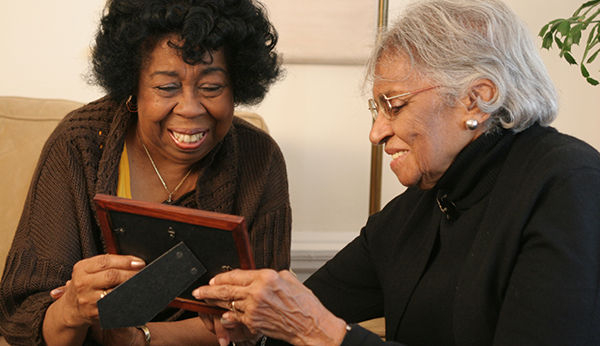WHAT WE'RE LEARNING
Dear Colleagues—
Hospitals and health systems have long recognized that a one-size-fits-all approach to treating patients doesn’t really fit everyone. We’re all unique, with different needs, circumstances, and preferences.
This is especially true for older adults, who often have both complex medical conditions and unmet social needs. These social needs might include a lack of reliable transportation, untreated mental health conditions, difficulty accessing or preparing healthy food, challenges taking medications as prescribed, needing help with daily living, loneliness and isolation, or others.
Now more clearly than ever, we understand how these unmet social needs affect whether—and how well—people respond to the health care services they receive. Older patients can receive the most thorough, state-of-the-art medical treatment available, but if they aren’t able to pick up their prescriptions, it may not matter. Our mission at The John A. Hartford Foundation is to improve the care of older adults and we want change.
That’s why we’ve been collaborating for more than three years with five other foundations to identify what works in caring for people with complex health and social needs. These are the people that many say incur half the country’s health care costs, but account for only 5 percent of the population. They cross all demographics—age, race, ethnicity, education, geography, and income.
Working together, our foundations are helping health systems, accountable care organizations, Medicare Advantage plans, and other health care entities better care for these people with complex health and social needs. Together with The Commonwealth Fund, the Milbank Memorial Fund, the Peterson Center on Healthcare, the Robert Wood Johnson Foundation, and The SCAN Foundation, we’re leveraging our grantmaking and expertise to identify what works in caring for this population. Together, we’ve created a robust library of essential resources, and are now exploring how to implement better care in a range of settings.
We know that when older adults with complex needs require medical help in this country, they encounter a health care system that’s expensive, inefficient, and poorly coordinated across hospitals, physician practices, and other places where older people go to receive care and supportive services. Health systems require new and different approaches to deliver care for these patients that are informed by data, aligned to their individual goals, and that accommodate their unique needs.
We’re learning that the most successful efforts use both medical and social approaches, which is what leading health systems nationwide are doing to improve care for individuals with complex needs. New metrics are helping us understand how various care models affect different types of patients. The evidence looks beyond emergency room visits and readmissions and now considers patient-centered metrics and quality-of-life measures such as annual number of days in the community or missed workdays. These efforts recognize and elevate the role of patients and their families, giving them a voice in their own care and health.
In practice, the health systems we’re working most closely with are organizing their approaches around an essential set of evidence-based practices that consider the outcomes and preferences that matter most to patients, consider how their medication is aligned with their goals and preferences, factor in their mental health, and take their mobility and physical safety into account.
We have an incredible opportunity to create a new standard of care with more insurers, hospitals, and health systems adopting age-friendly practices for patients with complex needs.
Adopted broadly, our health care system will gain the capacity to deliver the care everyone would hope for themselves and those they care about. We want care that is high-quality, coordinated, focused on our whole health, and most importantly, driven by our individual goals and priorities.
Sincerely,
Terry Fulmer, PhD, RN, FAAN
President, The John A. Hartford Foundation

